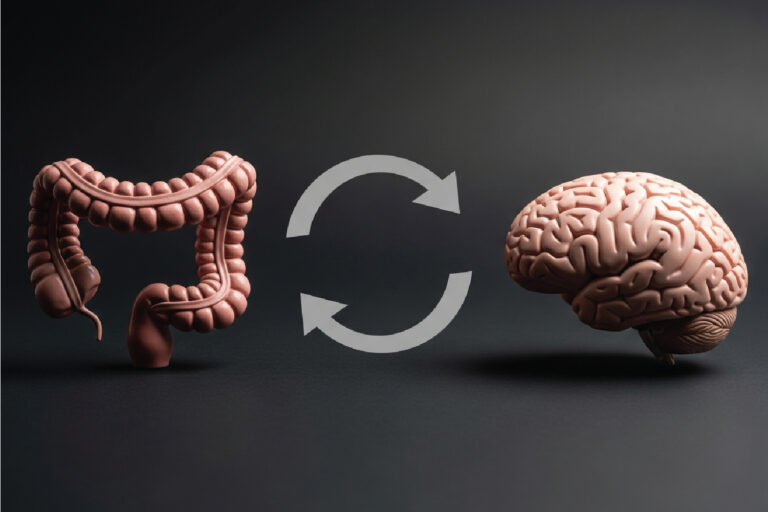The Gut-Brain Axis: How Gut Health Shapes Your Mood and Mind
by Anna Sandhu | Oct 29, 2025
Reviewed by Dr. Arun, M.Pharm., PGDRA, Ph.D.

Ever notice how your stomach tightens before a big presentation, or you feel “butterflies” when you’re excited? That’s not just emotion; it’s your gut and brain talking to each other.
This constant two-way conversation, called the gut-brain axis, connects your digestive system with your brain through nerves, hormones, and immune signals. Scientists now know that this link plays a major role in mood, emotions, focus, and even mental well-being.
In this article, let’s explore how your gut health affects your mind, and how small changes in food and lifestyle can help you feel calmer, clearer, and more balanced.
What Is the Gut-Brain Axis?
The gut-brain axis is a communication network that links the gut and the brain. It helps regulate digestion, mood, and emotional health. The gut doesn’t just digest food, it also produces chemical messengers called neurotransmitters, which influence how we think and feel.
A healthy gut sends positive signals to the brain, while an imbalanced gut can contribute to stress, anxiety, or low mood. That’s why supporting your gut can also mean supporting your emotional well-being.
The Gut Microbiota: Your Mental Wellness Ally
Inside your gut lives a diverse community of trillions of bacteria, your gut microbiota. These microorganisms help digest food, produce vitamins, and protect your intestinal lining. But they also play a surprising role in your mental health.
When your gut bacteria are in balance, they help produce serotonin, dopamine, and GABA, the “feel-good” neurotransmitters that affect mood and focus. But when this balance is disturbed (a condition called dysbiosis), it can disrupt hormone signals, and affect brain function, all of which can contribute to anxiety or depression.
Eating foods rich in fiber and probiotics can help restore this balance, supporting both your digestion and emotional stability.
How Gut Health and Mood Are Connected
The gut is sometimes called the “second brain” because it has its own complex nervous system, the enteric nervous system (ENS). It communicates constantly with your central nervous system (the brain and spinal cord), influencing emotions and mental clarity.
When your gut bacteria thrive, they send positive signals to your brain, helping reduce stress and improve focus. When your gut health suffers, from processed foods, lack of fiber, or stress, it can lead to low neurotransmitter levels, which may affect your mood.
Gut Health and Mental Well-Being
The body’s internal stress response is a normal part of its defense system, but when this response stays active for too long, it can disrupt brain chemistry. An imbalanced gut microbiome can influence this process, which may affect neurotransmitter activity and overall brain function.
Supporting your gut through:
- A fiber-rich diet
- Regular exercise
- Stress management
- Good sleep can help a healthier mood. A balanced gut often means a calmer mind.
How Diet Shapes the Gut-Brain Axis
Your food choices have a direct effect on gut and brain health. Diets high in refined sugar, processed fats, and artificial ingredients can harm good bacteria. On the other hand, a whole-food diet with fruits, vegetables, whole grains, lean proteins, and healthy fats supports your gut ecosystem and helps your brain function at its best.
Prebiotic foods like garlic, onions, bananas, and oats feed beneficial bacteria.
Probiotic foods like yogurt, kefir, and fermented vegetables add new beneficial strains to your gut.
Together, these help your gut microbiome stay strong, which can positively influence mood and focus.
Probiotics, Prebiotics, and Beyond
- Probiotics are live bacteria that help the natural balance of your gut microbiome.
- Prebiotics are the fibers that feed these bacteria so they can multiply and do their job better.
- Postbiotics are the beneficial compounds these bacteria produce once they digest prebiotics.
A diet rich in both probiotics and prebiotics, or a supplement that combines them, helps maintain a healthy gut-brain axis, promoting calmness and emotional resilience.
Lifestyle Habits That Support the Gut-Brain Connection
Gut health isn’t only about food, lifestyle matters too. Here are a few small habits that make a big difference:
- Manage stress: Meditation, yoga, or simple deep breathing can help calm both your gut and your mind.
- Get quality sleep: Poor sleep affects gut bacteria and raises stress hormones.
- Stay active: Regular movement improves circulation, digestion, and mood.
- Stay hydrated: Water helps nutrients absorb and keeps your gut functioning smoothly.
Together, these habits create a stable internal environment where your gut and brain can thrive in harmony.
Final Takeaway
Your gut and brain are partners in your well-being. When you nurture one, you support the other.
Eating fiber-rich foods, adding probiotics and prebiotics, staying active, and managing stress can help build a healthier gut-brain connection, leading to better mood, clearer thinking, and a greater sense of balance every day.
If you’re considering a gut health supplement, look for one that includes both prebiotic and probiotic support to strengthen this powerful connection naturally.
